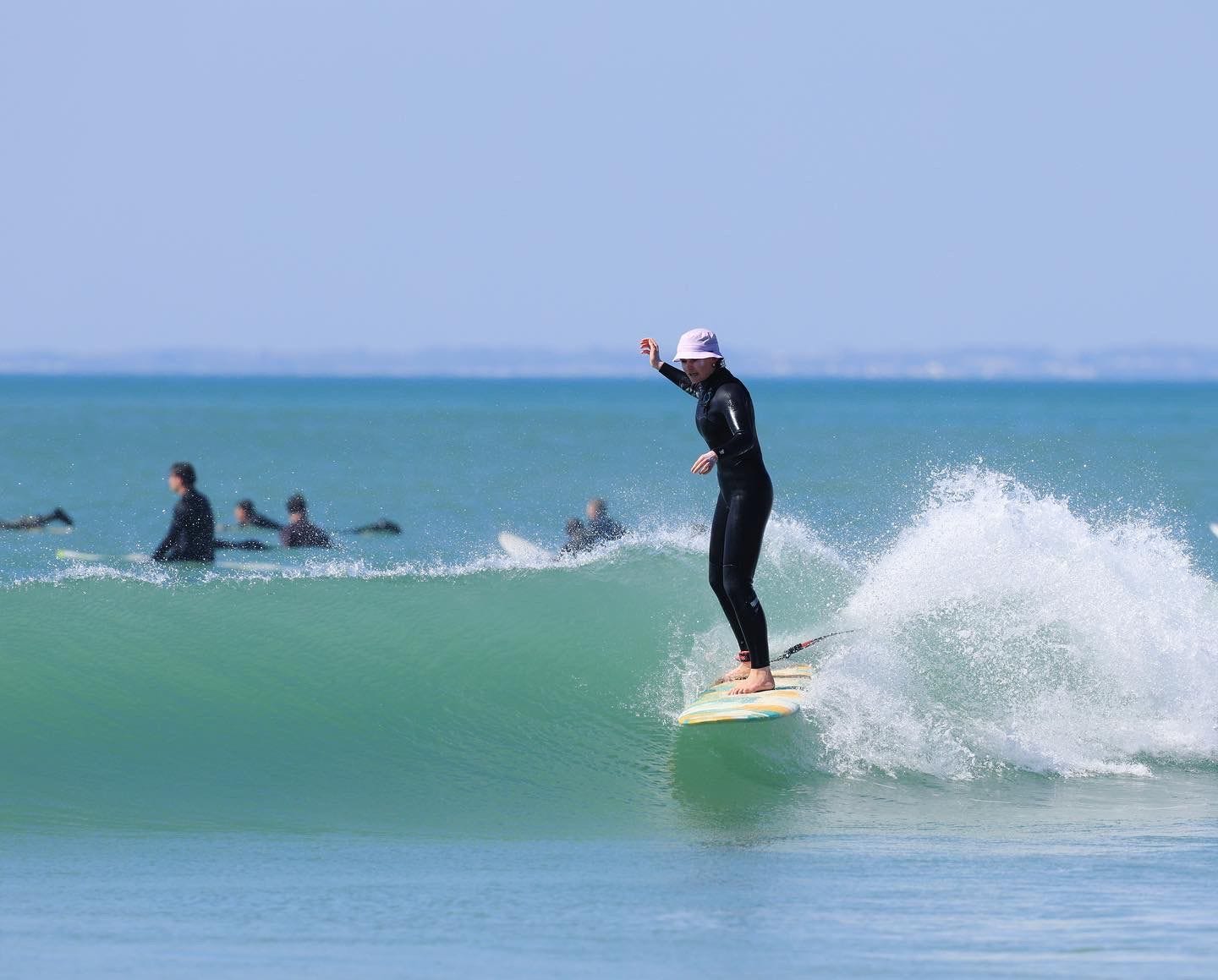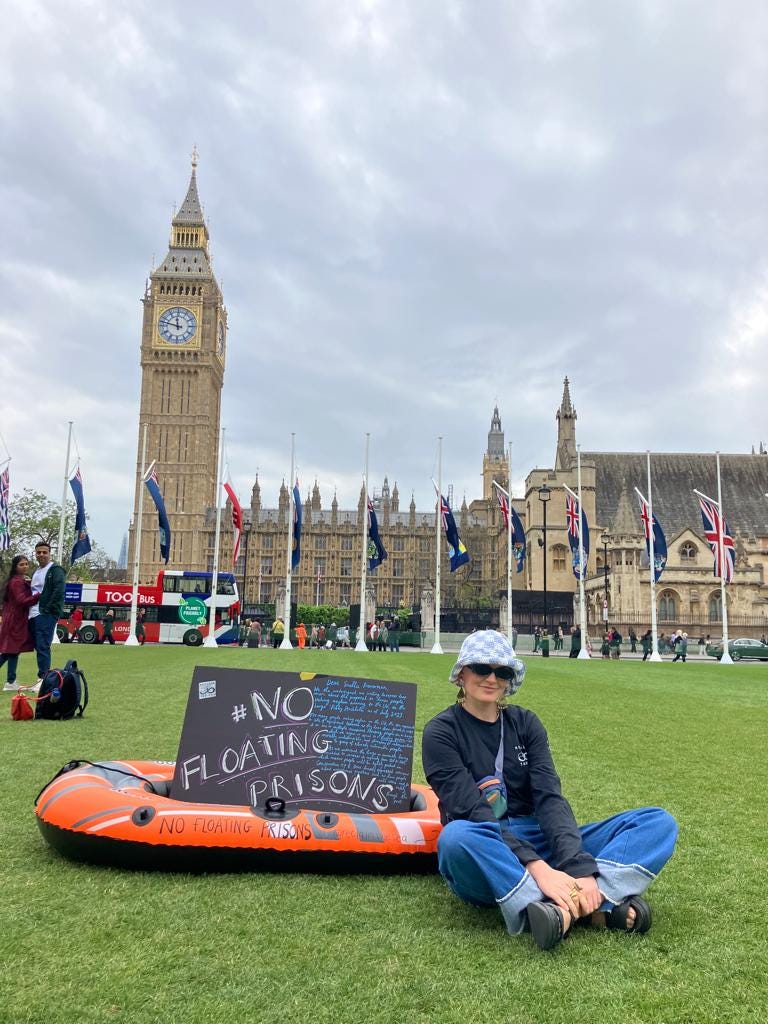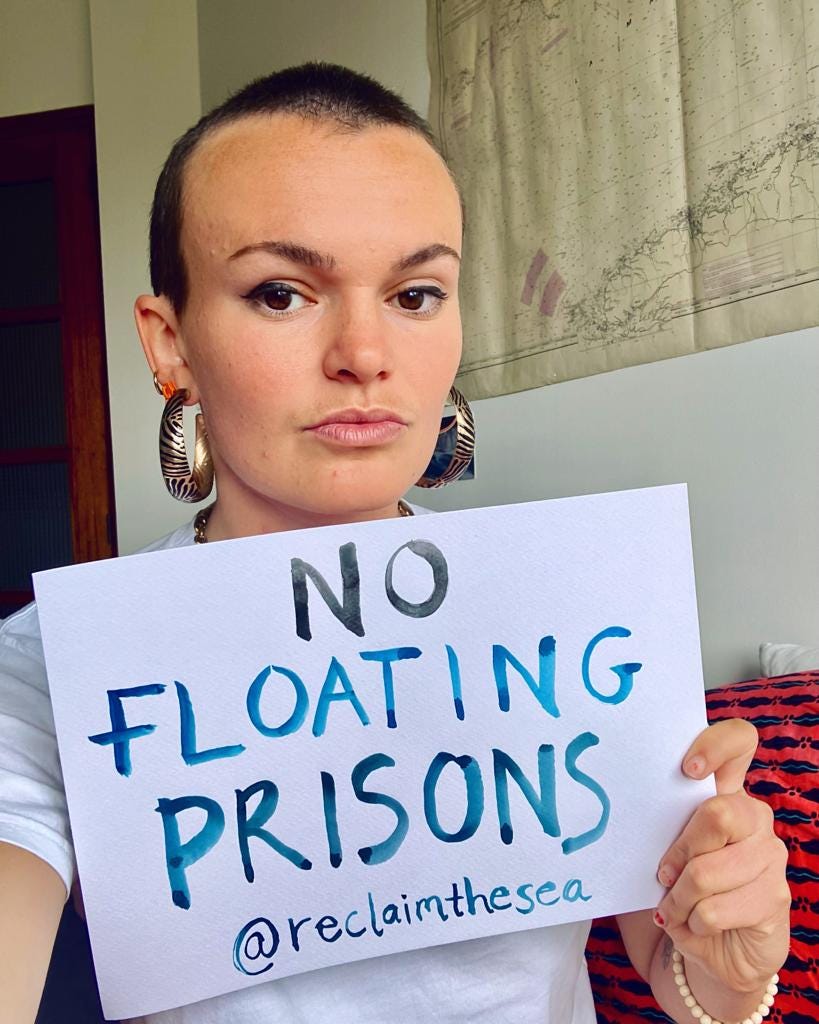“Because I was born with a certain passport, I can enjoy the sea…”
An interview with surfer, activist, and founder of Reclaim the Sea, Tigs Louis-Puttick, who lives in NW France
“It seemed really unjust that just because I was born with a certain passport, I can enjoy the sea in a certain way, whereas for people without the right papers the sea is instead a barrier and a dangerous horrendous place.”
I first met Tigs at the release of the Finisterre full-coverage Seasuit last year, when she was just about to launch Reclaim the Sea, a programme of sea swimming, surfing and paddle boarding classes for refugees, some of who would go on to wear the Seasuit.
I’ve interviewed her a couple of times since and always been struck by her intelligence and compassion, especially when it comes to the rights of refugees. We often talk about surfers who step up and effect positive change and Tigs is firmly in that camp.
We talk about her experiences with refugee boat landings, reframing the sea as a place of joy, the Titan submersible’s rescue response, and why surfers can be lazy when it comes to activism. I hope you enjoy our chat.
Hey Tigs, had any good surf lately?
Yes, I moved to Brittany in NW France in March and since then I’ve surfed more than I ever have in my life. I started a new job as operational rescue coordinator for Seawatch [a civil sea rescue charity] and it’s remote so I decided to move here as I’m half French and I wanted to explore my French heritage.
The waves have been insane, I found lots of sheltered spots in winter, and I’ve finally got better at mid-length surfing more recently which has been really fun as well.
Can you take us back to the origins of Reclaim the Sea?
In 2019, I was working in Lesbos doing emergency response for boat landings from Turkey. There was a big wave of people arriving from Afghanistan, Syria, and some parts of east Africa who were running into distress in their journeys and I was part of an NGO ensuring that people could arrive safely.
I used to be a beach lifeguard for the RNLI at home. I’m surf rescue and first aid-trained, so I thought how can I use these skills in the most useful way? It also really aligned with my political values and my approach to free movement and the right to asylum and refuge.
I grew up in Plymouth, five minutes from the sea, and my own experience of the sea was as this amazing healing joyful place, which contrasted with what I was seeing of the sea as a dangerous place, a place of distress and trauma.
It seemed really unjust that just because I was born with a certain passport, I can enjoy the sea in a certain way, whereas for people without the right papers the sea is instead a barrier and a dangerous horrendous place, so I decided to set up Reclaim the Sea.
How did you convince people who’d experienced trauma that the sea could bring them joy?
We chose to run the project in Plymouth as opposed to Lesbos or Calais so people would be at a later stage of their journeys and not in that direct moment of trauma.
One of the things that was really important for me was not to say we are healing the trauma of people, we're just giving them the tools to use the sea as a safe space. How they actually work through their own paths and stories is entirely up to them and not something we can do.
How different is teaching refugees to a bunch of kids in Surf Life Saving Club?
Over two thirds of participants that first year couldn’t swim confidently so the initial confidence in the water was a big thing. You have to really prepare people and get them in the mindset that they can do it, that it’s a safe space for them as well. We do a whole range of different sessions from swimming and surfing to paddle boarding.
It was interesting as getting in the water for something like swimming took a bit more effort from them and us compared to paddle boarding where you have this big floating platform that’s supporting you. Even people who couldn’t really swim at all felt quite comfortable getting on a paddle board.
Someone used the phrase: “I was able to be free as a bird and leave everything on the shore, at home” and anyone who loves the water can relate to that.
The surf session last year was one of our best sessions because it was also a beach picnic and really had that feeling of a fun day out. When we’d first shown them the pictures of women surfing, they’d all just laughed in disbelief that they could ever do that. But a couple of participants stood up on their first session which was amazing but even those who were lying down were riding waves and there was so much laughter and joyfulness, it was amazing.
The first year was a great success, how is this summer’s programme going?
We’re four weeks deep into our summer programme for women and three weeks into our summer programme for men. Last year we started only with women as we think there are extra barriers that women face, especially cultural barriers with the women we work with. But there is also a huge need for men to have this provision as well because a lot of men struggle with mental health and the sea provides a way they can access the mental health benefits of the sea too, while also making friends and finding community.
We’re looking at starting programmes in Yorkshire, France, Portugal, and Ireland in the future. It’s really taken off in the last year having started as a very small one-woman job to a team of around 30 volunteers.
Some of our ladies from last year are doing their paddle board instructor qualifications so they’ll be helping out on the sessions too. Refugee paddle board instructors could be a world first so that’s really amazing and exciting. We have some repeat joiners from last year too, including a mum and daughter from Iran who are lovely.
The really important thing for me is that we link up the positive work we do to the reasons why the majority of refugees have sea-related trauma. And that is because borders in the sea mean death in the sea or near-death experiences and trauma.
We’re working on a campaign called No Floating Prisons to try and encourage the government not to house people seeking asylum on floating prison ships. And recently we had that horrendous tragedy off the coast of Greece where 650 people lost their lives, when they were well within the Greek search and rescue zone.
It's been quite sickening to see the level of international response which was shown and delivered after the shipwreck compared to the Titan submersible adventure journey which went missing a week later. It's of course horrendously sad if anyone loses their life in the sea but they were fully aware of the risks they were taking when they were going on this adventure and it’s just depressing that the lives of 650 didn’t merit such a response.
And finally, what’s your advice for surfers who want to do more to help refugees?
Maybe you’ll hate me for saying this, but surfers are a lazy group. I think we just get very obsessed with surfing and in our own little bubble, so I would say break out of that bubble, go to some local organising meetings, join a local activist group or if you live in Plymouth or anywhere where we have Reclaim the Sea programmes, come and volunteer with us. It’s a really rewarding experience.
Or if you live in an area where there are no Reclaim the Sea programmes drop us an email and we can talk about setting one up. Particularly if you run a surf school or if you have any instructor qualifications for water sports. More generally, inform yourself about what is happening in the sea and with borders but also with pollution and deep sea mining. The sea is our special place so we need to protect it and nurture it and make it a safe, beautiful and clean environment for everyone.
To find out more about Reclaim the Sea and to support their work head here.
This is an interesting piece on the BBC World Service about the Greece boat disaster, including an interview with Tigs, and an article by Tigs on why floating prisons are such a bad idea for Open Democracy.
I also interviewed Tigs and Yvette from Wave Wahines for Issue 77 of Huck. It isn’t online but you can order it here.
Other news:
I wrote about the Italian fisher taking on the industrial deep sea trawlers for Huck and spoke to conservation experts about why we need to ban bottom trawling.
This Guardian piece about Tahiti hosting Olympic surf events was an interesting read and tied into the comment’s Léa Brassy made in the last newsletter, which you can read here.
Please fwd this newsletter to anyone who you think might be interested & if you have any story tips on any of these themes pls get in touch.





